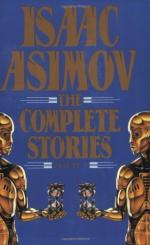|
This section contains 1,283 words (approx. 5 pages at 300 words per page) |

|
The solution to one of Asimov's most important questions, the role of the individual in history, lies in one of his most basic principles, the mystery-story structure. Can man control his fate, or is he part of a hurtling chain reaction in which individual initiatives are predestined or inconsequential? Isaac Asimov deals with this question specifically, yet we find a curious difficulty in determining his precise view. We can, however, clarify the question by examining Asimov in the context of Leo Tolstoy's theory of history….
Both Leo Tolstoy and Isaac Asimov portray the significance of human decisions and actions on a broad canvas. Immediate results are not the important factor, but whether such decisions can make a difference in the eventual outcome. Tolstoy extends his scope spatially. Asimov, availing himself of the unique feature of science fiction, extends his scope temporally as well as spatially…. Like Asimov's Hari...
|
This section contains 1,283 words (approx. 5 pages at 300 words per page) |

|


